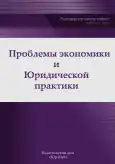About Strategic Directions of Information Security Protection and Further Development of the IT Sector
- Authors: Kiselev A.S.1,2, Barkov A.V.3,2
-
Affiliations:
- Moscow State Regional University
- Financial University under the Government of the Russian Federation
- Prince Alexander Nevsky Military University of the Ministry of Defense of the Russian Federation
- Issue: Vol 18, No 5 (2022)
- Pages: 95-99
- Section: Articles
- URL: https://journal-vniispk.ru/2541-8025/article/view/147348
- ID: 147348
Cite item
Abstract
About the authors
Alexander S. Kiselev
Moscow State Regional University; Financial University under the Government of the Russian Federation
Email: alskiselev@fa.ru
Cand. Sci. (Law), Associate Professor of the Department of Civil Law, Faculty of Law; Senior Lecturer, Department of International and Public Law, Faculty of Law Mytishchi, Moscow Region, Russian Federation; Moscow, Russian Federation
Alexey V. Barkov
Prince Alexander Nevsky Military University of the Ministry of Defense of the Russian Federation; Financial University under the Government of the Russian Federation
Email: barkov_a_v@mail.ru
Dr. Sci. (Law), Professor, Professor of the Department of Civil Law; Professor of the Department of Legal Regulation of Economic Activity Moscow, Russian Federation
References
- Barkov A.V., Kiselev A.S. On legal security of information and telecommunication infrastructure of banks and state structures // Banking law. 2022. No. 4. pp. 20-27.
- Barkov A.V., Kiselev A.S. The impact of digitalization on the legal provision of information security of the state and business in the context of modern geopolitical challenges // Business security. 2022. No. 3. pp. 3-7.
- Garmash D.S. The use of VPN systems as ensuring the security of the right to secrecy of correspondence // Legal sciences: topical issues of theory and practice: collection of articles of the V International Scientific and Practical Conference, Penza, May 15, 2022. -Penza: Science and Education (IP Gulyaev G.Yu.), 2022. pp. 213-215.
- Grineva O. V. Actual problems of «Internet piracy» in copyright // Student science about actual problems and prospects of innovative development of regional agro-industrial complex: Materials of the XXI scientific and practical conference of students, Tara, March 16, 2022. -Omsk: Omsk State Agrarian University named after P.A. Stolypin, 2022. pp. 217-219.
- Gorodetsky A. E. Time of mobilization: Russia before choosing historical alternatives // Development and Security. 2022. No. 1(13). pp. 4-15.
- Eremina D. A. Problems of copyright protection in the digital environment // Modern scientist. 2022. No. 2. pp. 291-295.
- Putin M. V. Using the Russian Astra Linux OS to ensure security // Science, Education, Innovations: Topical issues and modern aspects: collection of articles of the VI International Scientific and Practical Conference, Penza, March 10, 2021. -Penza: «Science and Education» (IP Gulyaev G.Yu.), 2021. pp. 55-57.
- Samarina V. P. On the issue of creating a Russian intelligence product to ensure national security, economic growth and improve the quality of life of the Russian Arctic // Economic security of Socio-economic systems: Challenges and Opportunities : Proceedings of the IV International Scientific and Practical Conference, Belgorod, April 28, 2022 / Edited by E.A. Stryabkova, N.A. Gerasimova, A.M. Kulik. -Belgorod: Epicenter Limited Liability Company, 2022. pp. 343-347.
- Smirnov V.M., Perebeynos K.A. Legal acts in the field of information security as one of the most important sources of information security of the Russian Federation // Trends in the development of science and education. 2022. No. 85-1. pp. 52-57.
- Yudina Yu.A. The possibility of applying means of ensuring international security to the information space // Actual problems of Russian law. 2022. Vol. 17. No. 6(139). pp. 168-176.
- Yumasheva T.A. Legal acts in the field of information security as one of the most important sources of information security of the Russian Federation // Actual problems of life safety in education: Materials of the All-Russian Scientific and practical Conference, Saratov, February 08, 2022. -Saratov: Publishing House «Saratov Source», 2022. pp. 266-269.
- Yanikeeva I.O. The role of cyber sanctions in international relations // Bulletin of the Diplomatic Academy of the Ministry of Foreign Affairs of Russia. Russia and the World. 2022. No. 1(31). pp. 6-33.
Supplementary files








